1.
מיר װאָס האָבן געלעבט
און זײַנען געשטאָרבן אין די געטאָס
צװישן הונגער און אָרעמקײַט,
מיר פּאַטרן ניט אַװסק דאָס װאָרט
ברידער.
װײַל מיר זײַנען און װילן
נאָר ברידער זײַן
פֿון זײ, װאָס האָבן געליטן
און לײַדן װי מיר
מיר װאָס האָבן געזען
שליסן זיך די טױערן
פֿון דער צײַט און דעם זכּרון
פֿאַר אַן אַרבעט
װאָס מאַכט נאָר שקלאַפֿן
אומענטשלעכע שמאַטעס אין די הענט
פֿון די פּײַניקערס
מיר װאָס האָבן געלעבט
און זײַנען געשטאָרבן אין די געטאָס
מיר װאָס זײַנען געגאַנגען
צו שװאַרצן און געשלאָסנעם טױט,
נײן.
מיר קענען נישט אַוועקפּאַטרן
דאָס װאָרט ברידער
2.
מיר פּאַטרן נישט אַװעק דאָס װאָרט ברידער
און דאָס װאָרט שװעסטער
און דאָס װאָרט קינדער
און דאָס װאָרט חבֿרים
און דאָס װאָרט שכנים
פֿאַר זײ, װאָס זײַנען ניט אונדזער ברידער
אָדער אונדזער שװעסטער
אָדער אונדזער קינדער
אָדער אונדזער חבֿרים
אָדער אונדזער שכנים
די װערטער זײַנען די אײנציקע זאַך
װאָס מיר האָבן
און אונדז איבערבלײַבט.
מיר פּאַטרן זײ ניט אַװעק
פֿאַר זײ, װאָס בױען געטאָס.
מיר פּאַטרן זײ ניט אַװעק
פֿאַר זײ, װאָס זעגן אונדז צו באַערן
און בױען די געטאָס בײַ די מוזײען.
מיר פּאַטרן זײ ניט אַװעק
פֿאַר זײ, װאָס פֿאַנגן און דריקן.
מיר פּאַטרן זײ ניט אַװעק
פֿאַר זײ, װאָס נעמט אונדזער נעמען
אונדזער לעבןס און אונדזער געשיכטעס
און אונדזער טױט
אום צו בױען מױערן פֿון געװײלטע פֿעלקער.
איר זײַט ניט אונדזער ברידער
3.
װאַרשע חרובֿ און פֿאַרחורבֿהט,
װאַרשע באַלאַגערט און געברענט
װאַרשע רוחות און חורבנות
װאַרשע אין אונדזער אױגן
װאַרשע אין אונדזער הענט
װאַרשע אין אונדזער לעבנס
װאַרשע אין אונדזער טױט
װאַרשע אין דעם קעגנשטאַנד
פֿון פֿרײַע מענער און פֿרױען
װאַרשע פֿון ברידער און שװעסטער
װאַרשע האָט ברידער און שװעסטער
װאַרשע האָט חבֿרים און חבֿרטעס
נאָר דאָרט, װוּ דער פֿלאַם
פֿון משוגען שטאָלצהײט האָט געשלאָגן.
נאָר דאָרט, װוּ דאָס קינד
גיט אָפּ מיט הענט אַרױף
צום סאָלדאַט.
נאָר דאָרט, װוּ מען װאַרפֿט
דעם שטײן קעגן דעם טאַנק.
נאָר דאָרט, װוּ מען מאַכט
דעם צוגעגרײטן חורבן.
װאַרשע האָט קײן ברידער
װאַרשע האָט קײן שװעסטער
דאָרט, װוּ װאַרשע װערט געניצט
אום אַנדערע הורבנות צו מאַכן.
װאַרשע האָט אױגן און געװיסן,
װאַרשע קענט דאָס געטאָ.
װאַרשע האָט ניט זײַן
פּריװילעגיע־נאַזיסטן.
װאַרשע קענט די נאַזיסטן
און דערקענט זײ גוט
אױך אין זײ, װאָס זעגן
זײ זײַנען ברידער און שװעסטער.
אזױ זײַן די ריכטיקע ברידער
אזױ זײַן די ריכטיקע שװעסטער
פֿון װאַרשע ניט אין דער װעלט
פֿון אױססשליסלעכע אַטאָמבאָמבן.
אזױ זײַן די ריכטיקע ברידער
אזױ זײַן די ריכטיקע שװעסטער
פֿון װאַרשע ניט דאָרט:
אַזױ זײַנען זײ אין עזה.
4.
אונדזער ברידער, אונדזער שװעסטער
האָבן נעמען, װאָס מיר האָבן ניט געקענט.
קײן יצחק, קײן רבקה
קײן שמואל, קײן שׂרה.
זײ הײסן איבראַהים, פֿאַטמאַ,
זײ הײסן מוהאַמאַד, לײַלה
זײ הײסן אַבער ריכטיק װי מיר:
זײ הײסן געטאָ.
זײ הײסן לאַגער.
זײ הײסן פֿאַרשטיקונג.
זײ הײסן רחל קאָרי
זײ הײסן װיטאָריאָ אַריגאָני
זײ הײסן די מױער חרוב מאַכן.
עס זײַן זײ, אונדזער ברידער,
עס זײַן זײ, אונדזער שװעסטער.
אין זײ דערקענגן מיר אונדז.
ברידער און שװעסטער פֿון די געטאָס
פֿון דער געשיכטע און דערצײַט.
פֿאַר זײ זינגן מיר
זאָג ניט קײנמאָל.
פֿאַר זײ פֿלאַנצן מיר
די געדענק־בעמער.
פֿאַר זײ שרײַבן טיר
די דאָזיקע װערטער
אױס דעם חושך און אױס די שרײַען
װוּ מיר לעבן אַ װײַטן טױט
און אָן אומקער.
מיר װאָס האָבן געלעבט
און זײַנען געשטאָרבן אין די געטאָס
צװישן הונגער און אָרעמקײַט,
מיר פּאַטרן ניט אַװסק דאָס װאָרט
ברידער.
ברידער און שװעסטער
אױס דעם געטאָ פֿון עזה
שלום עלינו.
מיר װאָס האָבן געלעבט
און זײַנען געשטאָרבן אין די געטאָס
צװישן הונגער און אָרעמקײַט,
מיר פּאַטרן ניט אַװסק דאָס װאָרט
ברידער.
װײַל מיר זײַנען און װילן
נאָר ברידער זײַן
פֿון זײ, װאָס האָבן געליטן
און לײַדן װי מיר
מיר װאָס האָבן געזען
שליסן זיך די טױערן
פֿון דער צײַט און דעם זכּרון
פֿאַר אַן אַרבעט
װאָס מאַכט נאָר שקלאַפֿן
אומענטשלעכע שמאַטעס אין די הענט
פֿון די פּײַניקערס
מיר װאָס האָבן געלעבט
און זײַנען געשטאָרבן אין די געטאָס
מיר װאָס זײַנען געגאַנגען
צו שװאַרצן און געשלאָסנעם טױט,
נײן.
מיר קענען נישט אַוועקפּאַטרן
דאָס װאָרט ברידער
2.
מיר פּאַטרן נישט אַװעק דאָס װאָרט ברידער
און דאָס װאָרט שװעסטער
און דאָס װאָרט קינדער
און דאָס װאָרט חבֿרים
און דאָס װאָרט שכנים
פֿאַר זײ, װאָס זײַנען ניט אונדזער ברידער
אָדער אונדזער שװעסטער
אָדער אונדזער קינדער
אָדער אונדזער חבֿרים
אָדער אונדזער שכנים
די װערטער זײַנען די אײנציקע זאַך
װאָס מיר האָבן
און אונדז איבערבלײַבט.
מיר פּאַטרן זײ ניט אַװעק
פֿאַר זײ, װאָס בױען געטאָס.
מיר פּאַטרן זײ ניט אַװעק
פֿאַר זײ, װאָס זעגן אונדז צו באַערן
און בױען די געטאָס בײַ די מוזײען.
מיר פּאַטרן זײ ניט אַװעק
פֿאַר זײ, װאָס פֿאַנגן און דריקן.
מיר פּאַטרן זײ ניט אַװעק
פֿאַר זײ, װאָס נעמט אונדזער נעמען
אונדזער לעבןס און אונדזער געשיכטעס
און אונדזער טױט
אום צו בױען מױערן פֿון געװײלטע פֿעלקער.
איר זײַט ניט אונדזער ברידער
3.
װאַרשע חרובֿ און פֿאַרחורבֿהט,
װאַרשע באַלאַגערט און געברענט
װאַרשע רוחות און חורבנות
װאַרשע אין אונדזער אױגן
װאַרשע אין אונדזער הענט
װאַרשע אין אונדזער לעבנס
װאַרשע אין אונדזער טױט
װאַרשע אין דעם קעגנשטאַנד
פֿון פֿרײַע מענער און פֿרױען
װאַרשע פֿון ברידער און שװעסטער
װאַרשע האָט ברידער און שװעסטער
װאַרשע האָט חבֿרים און חבֿרטעס
נאָר דאָרט, װוּ דער פֿלאַם
פֿון משוגען שטאָלצהײט האָט געשלאָגן.
נאָר דאָרט, װוּ דאָס קינד
גיט אָפּ מיט הענט אַרױף
צום סאָלדאַט.
נאָר דאָרט, װוּ מען װאַרפֿט
דעם שטײן קעגן דעם טאַנק.
נאָר דאָרט, װוּ מען מאַכט
דעם צוגעגרײטן חורבן.
װאַרשע האָט קײן ברידער
װאַרשע האָט קײן שװעסטער
דאָרט, װוּ װאַרשע װערט געניצט
אום אַנדערע הורבנות צו מאַכן.
װאַרשע האָט אױגן און געװיסן,
װאַרשע קענט דאָס געטאָ.
װאַרשע האָט ניט זײַן
פּריװילעגיע־נאַזיסטן.
װאַרשע קענט די נאַזיסטן
און דערקענט זײ גוט
אױך אין זײ, װאָס זעגן
זײ זײַנען ברידער און שװעסטער.
אזױ זײַן די ריכטיקע ברידער
אזױ זײַן די ריכטיקע שװעסטער
פֿון װאַרשע ניט אין דער װעלט
פֿון אױססשליסלעכע אַטאָמבאָמבן.
אזױ זײַן די ריכטיקע ברידער
אזױ זײַן די ריכטיקע שװעסטער
פֿון װאַרשע ניט דאָרט:
אַזױ זײַנען זײ אין עזה.
4.
אונדזער ברידער, אונדזער שװעסטער
האָבן נעמען, װאָס מיר האָבן ניט געקענט.
קײן יצחק, קײן רבקה
קײן שמואל, קײן שׂרה.
זײ הײסן איבראַהים, פֿאַטמאַ,
זײ הײסן מוהאַמאַד, לײַלה
זײ הײסן אַבער ריכטיק װי מיר:
זײ הײסן געטאָ.
זײ הײסן לאַגער.
זײ הײסן פֿאַרשטיקונג.
זײ הײסן רחל קאָרי
זײ הײסן װיטאָריאָ אַריגאָני
זײ הײסן די מױער חרוב מאַכן.
עס זײַן זײ, אונדזער ברידער,
עס זײַן זײ, אונדזער שװעסטער.
אין זײ דערקענגן מיר אונדז.
ברידער און שװעסטער פֿון די געטאָס
פֿון דער געשיכטע און דערצײַט.
פֿאַר זײ זינגן מיר
זאָג ניט קײנמאָל.
פֿאַר זײ פֿלאַנצן מיר
די געדענק־בעמער.
פֿאַר זײ שרײַבן טיר
די דאָזיקע װערטער
אױס דעם חושך און אױס די שרײַען
װוּ מיר לעבן אַ װײַטן טױט
און אָן אומקער.
מיר װאָס האָבן געלעבט
און זײַנען געשטאָרבן אין די געטאָס
צװישן הונגער און אָרעמקײַט,
מיר פּאַטרן ניט אַװסק דאָס װאָרט
ברידער.
ברידער און שװעסטער
אױס דעם געטאָ פֿון עזה
שלום עלינו.
inviata da CCG/AWS Staff - 18/10/2013 - 12:37
Lingua: Yiddish
La trascrizione del testo in caratteri latini
Transcription of lyrics into Latin characters
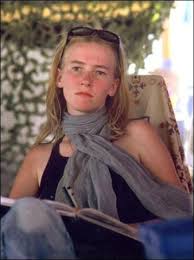
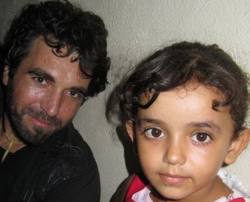
Transcription of lyrics into Latin characters

rokhlkori

זײ הײסן רחל קאָרי
זײ הײסן װיטאָריאָ אַריגאָני
זײ הײסן װיטאָריאָ אַריגאָני
Come sempre nel caso di testi in lingua Yiddish, la trascrizione è stata effettuata (in questo caso direttamente dall'autore) secondo i criteri YIVO.
As usual for Yiddish texts, the transcription has been made (in this case by the author him/herself) according to the YIVO guidelines. [CCG/AWS Staff]
As usual for Yiddish texts, the transcription has been made (in this case by the author him/herself) according to the YIVO guidelines. [CCG/AWS Staff]
DOS GETO FUN OZE
1.
Mir vos hobn gelebt
un zaynen geshtorbn in di getos
zvitshn hunger un oremkayt,
mir patrn nit avek dos vort
brider.
Vayl mir zaynen un viln
nor brider zayn
fun zey, vos hobn gelitn
un laydn vi mir.
mir vos hobn gezen
shlisn zikh di toyern
fun der tsayt un dem zikorn
far an arbet
vos makht nor shklafn
umentshlekhe shmates in di hent
fun di paynikers
mir vos hobn gelebt
un zaynen geshtorbn in di getos
mir vos zaynen gegangen
tsu shvartsn un geshlosnem toyt
neyn.
Mir kenen nisht avekpatrn
dos vort “brider”.
2.
Mir patrn nisht avek dos vort brider
un dos vort shvester
un dos vort kinder
un dos vort khaveyrim
un dos vort shkheynim
far zey, vos zaynen nit undzer brider
oder undzer shvester
oder undzer kinder
oder undzer khaveyrim
oder undzer shkheynim.
Di verter zaynen di eyntsike zakh
vos mir hobn
un undz iberblaybt.
Mir patrn zey nit avek
far zey, vos boyen getos.
Mir patrn zey nit avek
far zey, vos zegn undz tsu baern
un boyen di getos bay di muzeyen.
Mir patrn zey nit avek
far zey, vos fangn un drikn.
Mir patrn zey nit avek
far zey, vos nemt undzer nemen
undzer leybns un undzer geshikhtes
un undzer toyt
um tsu boyen moyern fun geveylte felker.
Ir zayt nit undzer brider.
3.
Varshe khorev un farkhurvet
Varshe balagert un gebrent
Varshe rukhes un khurbones
Varshe in undzer oygn
Varshe in undzer hent
Varshe in undzer leybns
Varshe in undzer toyt
Varshe in dem kegnshtand
fun fraye mener un froyen
Varshe fun brider un shvester
Varshe hot brider un shvester
Varshe hot khaveyrim un khavertes
nor dort, vu der flam
fun meshugen shtoltshayt hot geshlogn.
Nor dort, vu dos kind
git op mit hent aroyf
tsum soldat.
Nor dort, vu men varft
dem shteyn kegn dem tank.
Nor dort, vu men makht
dem tsugegreytn khurbm.
Varshe hot keyn brider
Varshe hot keyn shvester
dort, vu Varshe vert genitst
um andere khurbones tsu makhn.
Varshe hot oygn un gevisn,
Varshe kent dos geto.
Varshe hot nit zayn
privilegie-nazistn.
Varshe kent di nazistn
un derkent zey gut
oykh in zey, vos zegn
zey zaynen brider un shvester.
Azoy zayn di rikhtike brider
azoy zayn di rikhtike shvester
fun Varshe nit in der velt
fun oysshlislekhe atombombn.
Azoy zayn di rikhtike brider
azoy zayn di rikhtike shvester
fun Varshe nit dort:
azoy zaynen zey in Oze.
4.
Undzer brider, undzer shvester
hobn nemen, vos mir hobn nit gekent.
Keyn Itzik, keyn Rivke,
keyn Shmuel, keyn Sore.
Zey heysn Ibrahim, Fatma,
zey heysn Muhamad, Layla
zey heysn ober rikhtik vi mir:
zey heysn Geto.
Zey heysn lager.
Zey heysn Farshtikung.
Zey heysn Rokhl Kori
zey heysn Vitoryo Arigoni
zey heysn Di Moyer khorev makhn.
Es zayn zey, undzer brider,
es zayn zey, undzer shvester.
In zey derkenen mir undz.
Brider un shvester oys di getos
fun der geshikhte un dertsayt.
Far zey zingn mir
“Zog nit keynmol”.
Far zey flantsn mir
di gedenk-beymer.
Far zey shraybn mir
di dozike verter
oys dem khoyshekh un oys di shrayen
vu mir lebn a vaytn toyt
un on umker.
Mir vos hobn gelebt
un zaynen geshtorbn in di getos
zvitshn hunger un oremkayt,
mir patrn nit avek dos vort
brider.
Brider un shvester
oys dem geto fun Oze
sholem aleynu.
1.
Mir vos hobn gelebt
un zaynen geshtorbn in di getos
zvitshn hunger un oremkayt,
mir patrn nit avek dos vort
brider.
Vayl mir zaynen un viln
nor brider zayn
fun zey, vos hobn gelitn
un laydn vi mir.
mir vos hobn gezen
shlisn zikh di toyern
fun der tsayt un dem zikorn
far an arbet
vos makht nor shklafn
umentshlekhe shmates in di hent
fun di paynikers
mir vos hobn gelebt
un zaynen geshtorbn in di getos
mir vos zaynen gegangen
tsu shvartsn un geshlosnem toyt
neyn.
Mir kenen nisht avekpatrn
dos vort “brider”.
2.
Mir patrn nisht avek dos vort brider
un dos vort shvester
un dos vort kinder
un dos vort khaveyrim
un dos vort shkheynim
far zey, vos zaynen nit undzer brider
oder undzer shvester
oder undzer kinder
oder undzer khaveyrim
oder undzer shkheynim.
Di verter zaynen di eyntsike zakh
vos mir hobn
un undz iberblaybt.
Mir patrn zey nit avek
far zey, vos boyen getos.
Mir patrn zey nit avek
far zey, vos zegn undz tsu baern
un boyen di getos bay di muzeyen.
Mir patrn zey nit avek
far zey, vos fangn un drikn.
Mir patrn zey nit avek
far zey, vos nemt undzer nemen
undzer leybns un undzer geshikhtes
un undzer toyt
um tsu boyen moyern fun geveylte felker.
Ir zayt nit undzer brider.
3.
Varshe khorev un farkhurvet
Varshe balagert un gebrent
Varshe rukhes un khurbones
Varshe in undzer oygn
Varshe in undzer hent
Varshe in undzer leybns
Varshe in undzer toyt
Varshe in dem kegnshtand
fun fraye mener un froyen
Varshe fun brider un shvester
Varshe hot brider un shvester
Varshe hot khaveyrim un khavertes
nor dort, vu der flam
fun meshugen shtoltshayt hot geshlogn.
Nor dort, vu dos kind
git op mit hent aroyf
tsum soldat.
Nor dort, vu men varft
dem shteyn kegn dem tank.
Nor dort, vu men makht
dem tsugegreytn khurbm.
Varshe hot keyn brider
Varshe hot keyn shvester
dort, vu Varshe vert genitst
um andere khurbones tsu makhn.
Varshe hot oygn un gevisn,
Varshe kent dos geto.
Varshe hot nit zayn
privilegie-nazistn.
Varshe kent di nazistn
un derkent zey gut
oykh in zey, vos zegn
zey zaynen brider un shvester.
Azoy zayn di rikhtike brider
azoy zayn di rikhtike shvester
fun Varshe nit in der velt
fun oysshlislekhe atombombn.
Azoy zayn di rikhtike brider
azoy zayn di rikhtike shvester
fun Varshe nit dort:
azoy zaynen zey in Oze.
4.
Undzer brider, undzer shvester
hobn nemen, vos mir hobn nit gekent.
Keyn Itzik, keyn Rivke,
keyn Shmuel, keyn Sore.
Zey heysn Ibrahim, Fatma,
zey heysn Muhamad, Layla
zey heysn ober rikhtik vi mir:
zey heysn Geto.
Zey heysn lager.
Zey heysn Farshtikung.
Zey heysn Rokhl Kori
zey heysn Vitoryo Arigoni
zey heysn Di Moyer khorev makhn.
Es zayn zey, undzer brider,
es zayn zey, undzer shvester.
In zey derkenen mir undz.
Brider un shvester oys di getos
fun der geshikhte un dertsayt.
Far zey zingn mir
“Zog nit keynmol”.
Far zey flantsn mir
di gedenk-beymer.
Far zey shraybn mir
di dozike verter
oys dem khoyshekh un oys di shrayen
vu mir lebn a vaytn toyt
un on umker.
Mir vos hobn gelebt
un zaynen geshtorbn in di getos
zvitshn hunger un oremkayt,
mir patrn nit avek dos vort
brider.
Brider un shvester
oys dem geto fun Oze
sholem aleynu.
inviata da CCG/AWS Staff - 17/10/2013 - 16:44
Lingua: Italiano
La traduzione in lingua italiana.
Italian translation
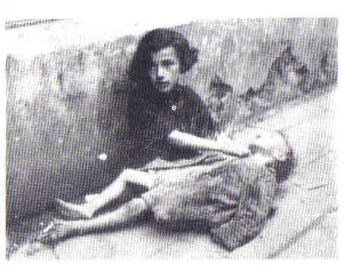
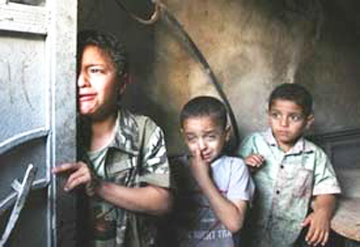
Italian translation

Bambini del ghetto di Varsavia. Warsaw Ghetto children.

Bambini del ghetto di Gaza. Gaza Ghetto children.
Anche la traduzione italiana ci è stata inviata direttamente dall'anonimo autore.
The following Italian translation was also contributed by the anonymous author.
The following Italian translation was also contributed by the anonymous author.
IL GHETTO DI GAZA
1.
Noi che abbiamo vissuto
e siamo morti nei ghetti
tra fame e miseria,
non sprechiamo la parola
“fratelli”.
Perché siamo e vogliamo
essere fratelli soltanto
di chi ha sofferto e soffre
come noi.
Noi che abbiamo veduto
chiudersi i cancelli
del tempo e della memoria
di fronte a un lavoro
che rende soltanto schiavi
disumani stracci nelle mani
degli aguzzini
Noi che abbiamo vissuto
e siamo morti nei ghetti
noi che siamo andati
a una morte nera e chiusa,
no.
Non possiamo sprecare
la parola “fratelli”.
2.
Non sprechiamo la parola “fratelli”
e la parola “sorelle”
e la parola “figli”
e la parola “amici”
e la parola “compagni”
e la parola “vicini”
per chi non è nostro fratello
o nostro figlio
o nostro amico
o nostro compagno
o nostro vicino.
Le parole sono l'unica
cosa che abbiamo
e che ci rimane.
Non le sprechiamo
per chi costruisce ghetti.
Non le sprechiamo
per chi dice di onorarci
e costruisce i ghetti accanto ai musei.
Non le sprechiamo
per chi imprigiona e opprime.
Non le sprechiamo
per chi prende i nostri nomi
le nostre vite e le nostre storie
e la nostra morte
per costruire muri di popoli eletti.
Voi non siete nostri fratelli.
3.
Varsavia distrutta e smembrata
Varsavia assediata e bruciata
Varsavia fantasmi e macerie
Varsavia nei nostri occhi
Varsavia nelle nostre mani
Varsavia nelle nostre vite
Varsavia nella nostra morte
Varsavia nella ribellione
di uomini e di donne libere
Varsavia di fratelli e sorelle
Varsavia ha fratelli e sorelle
Varsavia ha compagni e compagne
soltanto laddove la fiamma
di folle superbia ha colpito.
Soltando laddove il bambino
si arrende con le mani alzate
al soldato.
Soltanto laddove si lancia
la pietra contro il carro armato.
Soltanto laddove si compie
lo sterminio preparato.
Varsavia non ha fratelli
Varsavia non ha sorelle
laddove Varsavia è usata
per compiere altri stermini.
Varsavia ha occhi e coscienza,
Varsavia conosce il ghetto.
Varsavia non ha i suoi
nazisti privilegiati.
Varsavia conosce i nazisti
e li sa riconoscere bene
anche in coloro che dicono
d'essere fratelli e sorelle.
Per questo i veri fratelli
per questo le vere sorelle
di Varsavia non sono nel mondo
delle bombe H esclusive.
Per questo i veri fratelli
per questo le vere sorelle
di Varsavia non sono là:
per questo sono a Gaza.
4.
I nostri fratelli e le nostre sorelle
hanno nomi che non conoscevamo.
Non gli Itzik, le Rivke,
non gli Shmuel, le Sore.
Si chiamano Ibrahim, Fatma,
si chiamano Muhammad, Layla,
ma hanno lo stesso nostro nome:
si chiamano Ghetto.
Si chiamano Lager.
Si chiamano Repressione.
Si chiamano Rachel Corrie
si chiamano Vittorio Arrigoni
si chiamano Abbattere il Muro.
Questi sono i nostri fratelli,
queste le nostre sorelle.
In loro ci riconosciamo.
Fratelli e sorelle dei ghetti
della storia e del presente.
Per loro cantiamo
“Zog nit keynmol”.
Per loro piantiamo
gli alberi della memoria.
Per loro scriviamo
queste parole
dalle tenebre e dalle grida
dove viviamo una morte lontana
e senza ritorno.
Noi che abbiamo vissuto
e siamo morti nei ghetti
tra fame e miseria,
non sprechiamo la parola
“fratelli”.
Fratelli e sorelle
del ghetto di Gaza,
la pace su di noi.
1.
Noi che abbiamo vissuto
e siamo morti nei ghetti
tra fame e miseria,
non sprechiamo la parola
“fratelli”.
Perché siamo e vogliamo
essere fratelli soltanto
di chi ha sofferto e soffre
come noi.
Noi che abbiamo veduto
chiudersi i cancelli
del tempo e della memoria
di fronte a un lavoro
che rende soltanto schiavi
disumani stracci nelle mani
degli aguzzini
Noi che abbiamo vissuto
e siamo morti nei ghetti
noi che siamo andati
a una morte nera e chiusa,
no.
Non possiamo sprecare
la parola “fratelli”.
2.
Non sprechiamo la parola “fratelli”
e la parola “sorelle”
e la parola “figli”
e la parola “amici”
e la parola “compagni”
e la parola “vicini”
per chi non è nostro fratello
o nostro figlio
o nostro amico
o nostro compagno
o nostro vicino.
Le parole sono l'unica
cosa che abbiamo
e che ci rimane.
Non le sprechiamo
per chi costruisce ghetti.
Non le sprechiamo
per chi dice di onorarci
e costruisce i ghetti accanto ai musei.
Non le sprechiamo
per chi imprigiona e opprime.
Non le sprechiamo
per chi prende i nostri nomi
le nostre vite e le nostre storie
e la nostra morte
per costruire muri di popoli eletti.
Voi non siete nostri fratelli.
3.
Varsavia distrutta e smembrata
Varsavia assediata e bruciata
Varsavia fantasmi e macerie
Varsavia nei nostri occhi
Varsavia nelle nostre mani
Varsavia nelle nostre vite
Varsavia nella nostra morte
Varsavia nella ribellione
di uomini e di donne libere
Varsavia di fratelli e sorelle
Varsavia ha fratelli e sorelle
Varsavia ha compagni e compagne
soltanto laddove la fiamma
di folle superbia ha colpito.
Soltando laddove il bambino
si arrende con le mani alzate
al soldato.
Soltanto laddove si lancia
la pietra contro il carro armato.
Soltanto laddove si compie
lo sterminio preparato.
Varsavia non ha fratelli
Varsavia non ha sorelle
laddove Varsavia è usata
per compiere altri stermini.
Varsavia ha occhi e coscienza,
Varsavia conosce il ghetto.
Varsavia non ha i suoi
nazisti privilegiati.
Varsavia conosce i nazisti
e li sa riconoscere bene
anche in coloro che dicono
d'essere fratelli e sorelle.
Per questo i veri fratelli
per questo le vere sorelle
di Varsavia non sono nel mondo
delle bombe H esclusive.
Per questo i veri fratelli
per questo le vere sorelle
di Varsavia non sono là:
per questo sono a Gaza.
4.
I nostri fratelli e le nostre sorelle
hanno nomi che non conoscevamo.
Non gli Itzik, le Rivke,
non gli Shmuel, le Sore.
Si chiamano Ibrahim, Fatma,
si chiamano Muhammad, Layla,
ma hanno lo stesso nostro nome:
si chiamano Ghetto.
Si chiamano Lager.
Si chiamano Repressione.
Si chiamano Rachel Corrie
si chiamano Vittorio Arrigoni
si chiamano Abbattere il Muro.
Questi sono i nostri fratelli,
queste le nostre sorelle.
In loro ci riconosciamo.
Fratelli e sorelle dei ghetti
della storia e del presente.
Per loro cantiamo
“Zog nit keynmol”.
Per loro piantiamo
gli alberi della memoria.
Per loro scriviamo
queste parole
dalle tenebre e dalle grida
dove viviamo una morte lontana
e senza ritorno.
Noi che abbiamo vissuto
e siamo morti nei ghetti
tra fame e miseria,
non sprechiamo la parola
“fratelli”.
Fratelli e sorelle
del ghetto di Gaza,
la pace su di noi.
inviata da CCG/AWS Staff - 17/10/2013 - 16:50
Lingua: Inglese
Traduzione inglese di Riccardo Venturi
Enghish Transation by Riccardo Venturi
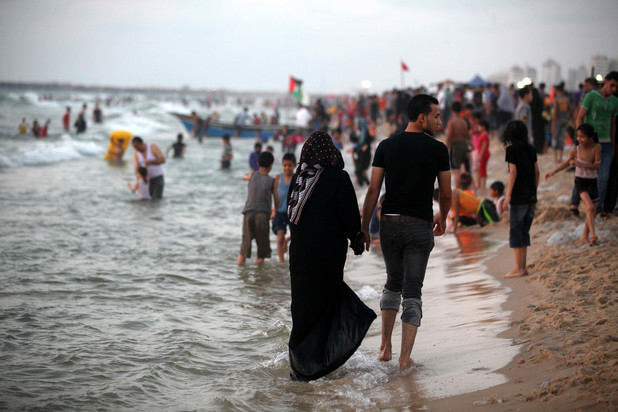
Enghish Transation by Riccardo Venturi

THE GAZA GHETTO
1.
We, who have lived
And have died in the ghettos
In hunger and distress,
We do not waste the word
“Brothers”.
Because we are, and only
Want to be brothers
Of those who suffered
And suffer like us now.
We, who have seen
The gates of time and memory
Close before work
That makes us only slaves,
Unhuman rags in the hands
Of the torturers
We, who have lived
And have died in the ghettos
We, who have gone
To a black and locked death,
No,
We cannot waste
The word “Brothers”.
2.
We do not waste the word “Brothers”
And the word “Sisters”
And the word “Children”
And the word “Friends”
And the word “Comrades”
And the word “Neighbors”
For them, who are not our brothers
Nor our children
Nor our friends
Nor our comrades
Nor our neighbors.
Words are the only
Thing that we have
And is left to us.
We do not waste them
For them, who build ghettos-
We do not waste them
For them, who say they honour us
And then build ghettos next to museums.
We do not waste them
For them, who imprison and oppress.
We do not waste them
For them, who take our names
Our lives and our stories
And our death
And build with all that
Walls of chosen peoples.
You are not our brothers.
3.
Warsaw destroyed and dismembered
Warsaw besieged and burned
Warsaw ghosts and ruins
Warsaw in our eyes
Warsaw in our lives
Warsaw in our hands
Warsaw in our lives
Warsaw in our death
Warsaw in the rebellion
Of free men and women
Warsaw of brothers and sisters
Warsaw has brothers and sisters
Warsaw has comrades
Only there, where the flame
Of mad proudness did strike.
Only there, where the child
Surrenders with hands up
To the soldier.
Only there, where the stone
Is thrown against the tank.
Only there, where the massacre
Is prepared and carried out.
Warsaw has no brothers
Warsaw has no sisters
Where Warsaw is used
To carry out further massacres.
Warsaw has eyes and a conscience,
Warsaw knows the ghetto.
Warsaw has no
Privileged Nazis.
Warsaw knows the Nazis
And can recognize them well
Even in those saying
They are brothers and sisters.
That's why the true brothers
That's why the true sisters
Of Warsaw are not to be found
In the world of exclusive H-bombs.
That's why the true brothers
That's why the true sisters
Of Warsaw are not to be found there:
That's why they are in Gaza.
4.
Our brothers and our sisters
Bear names we did not know.
No Yitzik, no Rivke,
No Shmuel, no Sore.
Their names are Ibrahim, Fatma,
Their names are Muhammad, Laylah,
Yet they bear the same name as ours:
Their name is Ghetto.
Their name is Lager.
Their name is Repression.
Their name is Rachel Corrie
Their name is Vittorio Arrigoni
Their name is Destroy the Wall.
These are our brothers.
These are our sisters.
In them do we recognize ourselves.
Brothers and sisters of the ghettos
Of History and of Nowadays.
For them we are singing
“Zog nit keynmol”.
For them we are planting
The trees of memory.
For them we are writing
These words
Out of the darkness and the cries
Where we are living a remote death
Without return.
We, who have lived
And have died in the ghettos
In hunger and distress,
We do not waste the word
“Brothers”.
Brothers and sisters
Of the Gaza ghetto,
Peace be upon us.
1.
We, who have lived
And have died in the ghettos
In hunger and distress,
We do not waste the word
“Brothers”.
Because we are, and only
Want to be brothers
Of those who suffered
And suffer like us now.
We, who have seen
The gates of time and memory
Close before work
That makes us only slaves,
Unhuman rags in the hands
Of the torturers
We, who have lived
And have died in the ghettos
We, who have gone
To a black and locked death,
No,
We cannot waste
The word “Brothers”.
2.
We do not waste the word “Brothers”
And the word “Sisters”
And the word “Children”
And the word “Friends”
And the word “Comrades”
And the word “Neighbors”
For them, who are not our brothers
Nor our children
Nor our friends
Nor our comrades
Nor our neighbors.
Words are the only
Thing that we have
And is left to us.
We do not waste them
For them, who build ghettos-
We do not waste them
For them, who say they honour us
And then build ghettos next to museums.
We do not waste them
For them, who imprison and oppress.
We do not waste them
For them, who take our names
Our lives and our stories
And our death
And build with all that
Walls of chosen peoples.
You are not our brothers.
3.
Warsaw destroyed and dismembered
Warsaw besieged and burned
Warsaw ghosts and ruins
Warsaw in our eyes
Warsaw in our lives
Warsaw in our hands
Warsaw in our lives
Warsaw in our death
Warsaw in the rebellion
Of free men and women
Warsaw of brothers and sisters
Warsaw has brothers and sisters
Warsaw has comrades
Only there, where the flame
Of mad proudness did strike.
Only there, where the child
Surrenders with hands up
To the soldier.
Only there, where the stone
Is thrown against the tank.
Only there, where the massacre
Is prepared and carried out.
Warsaw has no brothers
Warsaw has no sisters
Where Warsaw is used
To carry out further massacres.
Warsaw has eyes and a conscience,
Warsaw knows the ghetto.
Warsaw has no
Privileged Nazis.
Warsaw knows the Nazis
And can recognize them well
Even in those saying
They are brothers and sisters.
That's why the true brothers
That's why the true sisters
Of Warsaw are not to be found
In the world of exclusive H-bombs.
That's why the true brothers
That's why the true sisters
Of Warsaw are not to be found there:
That's why they are in Gaza.
4.
Our brothers and our sisters
Bear names we did not know.
No Yitzik, no Rivke,
No Shmuel, no Sore.
Their names are Ibrahim, Fatma,
Their names are Muhammad, Laylah,
Yet they bear the same name as ours:
Their name is Ghetto.
Their name is Lager.
Their name is Repression.
Their name is Rachel Corrie
Their name is Vittorio Arrigoni
Their name is Destroy the Wall.
These are our brothers.
These are our sisters.
In them do we recognize ourselves.
Brothers and sisters of the ghettos
Of History and of Nowadays.
For them we are singing
“Zog nit keynmol”.
For them we are planting
The trees of memory.
For them we are writing
These words
Out of the darkness and the cries
Where we are living a remote death
Without return.
We, who have lived
And have died in the ghettos
In hunger and distress,
We do not waste the word
“Brothers”.
Brothers and sisters
Of the Gaza ghetto,
Peace be upon us.
18 ottobre 2013: Lo snapshot della CCG n° 20000
October 18, 2013: AWS nr 20,000 snapshot
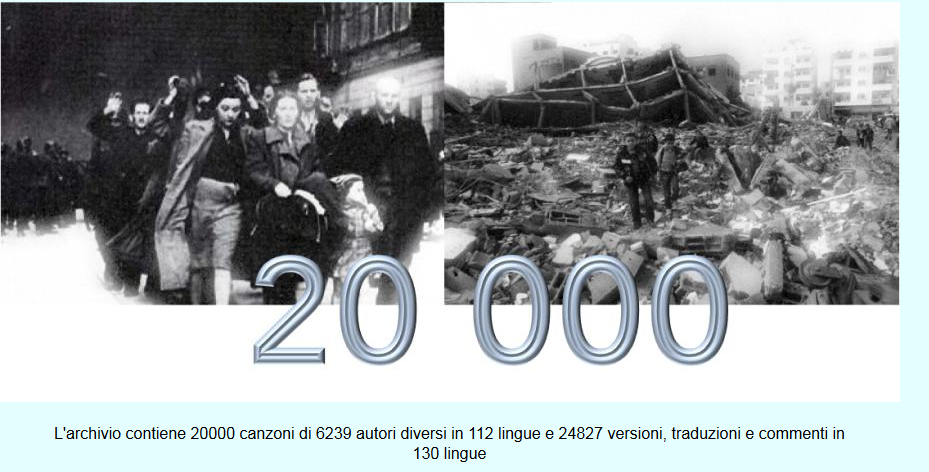
October 18, 2013: AWS nr 20,000 snapshot

CCG/AWS Staff - 18/10/2013 - 12:49
HENK ZANOLI, "GIUSTO FRA LE NAZIONI", RESTITUISCE LA MEDAGLIA: "L'OFFENSIVA SU GAZA E' UNA VERGOGNA"
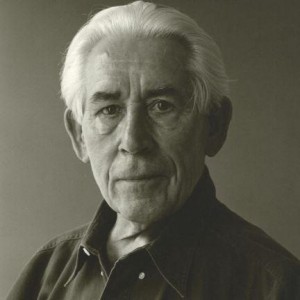
Clamoroso gesto di Henk Zanoli, olandese di 91 anni, che nel 1943 salvò la vita a un bambino ebreo. Sei familiari dell'uomo sono morti negli ultimi attacchi di Israele sulla Striscia. E lui dice basta: "Sarebbe un insulto alla memoria di mia madre"
Henk Zanoli è olandese, ha 91 anni e, almeno fino a qualche giorno fa, era un "Giusto tra le Nazioni". Cioè un non-ebreo che, durante l'Olocausto, ha salvato la vita di un ebreo, in questo caso un bambino. Il piccolo si chiamava Elhanan Pinto, era nato nel 1932 ed è sopravvissuto all'orrore della Shoah grazie a Zanoli. Il quale, insieme alla madre Johana, l'ha tenuto al riparo dalla furia nazista nella sua casa di Eemnes, vicino a Utrecht, dal 1943 al 1945, anno in cui gli Alleati liberarono i Paesi Bassi. Sia Johana che Henk rischiarono la vita per preservare quella di Elhanan. I genitori e i fratelli del bimbo, intanto, venivano trucidati in un campo di concentramento del Terzo Reich.
La storia di Zanoli. Come racconta il sito ufficiale dello Yad Vashem, il celebre museo dell'Olocausto di Gerusalemme, nel 1943 Henk Zanoli, allora poco più che ventenne, da Emmes fece un rischiosissimo viaggio verso Amsterdam (guardie e controlli erano ovunque) per andare a prendere il bambino e accompagnarlo a casa. Qui, con la madre Johana, protesse per due anni Elhanan, che "trovò un ambiente accogliente e pieno di amore", si legge sul sito dello Yad Vashem. "A guerra finita, uno zio andò a prendere il piccolo per lasciarlo in un orfanotrofio ebraico. Successivamente, Elchanan si trasferì in Israele con altri amici e cambiò il suo nome in Hameiri".
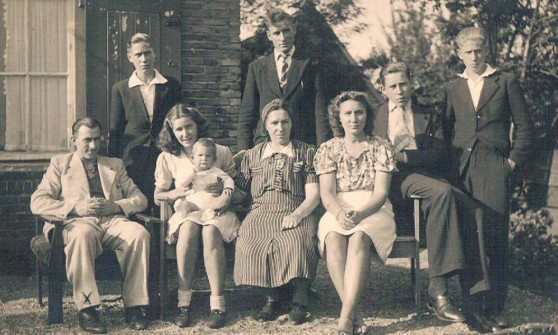
La decisione. Oggi, però, Henk Zanoli "Giusto tra le Nazioni" non lo è più. Per sua scelta. Come riporta il quotidiano israeliano Haaretz, Zanoli ha restituito la medaglia di "Giusto" ricevuta dalle autorità israeliane. E ha chiesto la cancellazione del suo nome dal Giardino dello Yad Vashem. Questo per protesta contro l'ultima offensiva di Israele su Gaza, in cui sono morte circa 2mila persone, molte delle quali civili, ma anche sei suoi familiari, incluso un bambino di dodici anni.
I familiari morti. Perché la nipote di Zanoli, la diplomatica olandese Angelique Eijpe, ha sposato un palestinese nato nel campo profughi di Al-Bureij, a Gaza. E gran parte dei familiari della coppia vive nella Striscia. I due coniugi, durante l'offensiva, non erano a Gaza. Altri familiari, però, non sono potuti sfuggire ai raid. E sei di questi sono morti. Così, a inizio settimana, Zanoli si è presentato all'ambasciata israeliana di Amsterdam e ha restituito la medaglia e la lettera di "Giusto tra le Nazioni".
La lettera. Zanoli, un avvocato in pensione, ha poi scritto una lettera aperta per giustificare il suo clamoroso gesto: "E' davvero terribile che oggi, quattro generazioni dopo, la nostra famiglia debba sopportare l'uccisione di altri suoi membri. Uccisioni di cui è responsabile lo stato di Israele. Per me, dunque, conservare questa medaglia sarebbe un insulto alla memoria della mia coraggiosa madre". Il marito della donna e padre di Zanoli (anche lui faceva Henk di nome) venne internato nel campo di concentramento di Mauthausen nel 1941 perché aveva protestato contro l'occupazione di Hitler. Resistette alle atroci crudeltà dei nazisti fino al febbraio 1945. Poi morì.
(Articolo di Antonello Guerrera)

Henk Zanoli.
Clamoroso gesto di Henk Zanoli, olandese di 91 anni, che nel 1943 salvò la vita a un bambino ebreo. Sei familiari dell'uomo sono morti negli ultimi attacchi di Israele sulla Striscia. E lui dice basta: "Sarebbe un insulto alla memoria di mia madre"
Henk Zanoli è olandese, ha 91 anni e, almeno fino a qualche giorno fa, era un "Giusto tra le Nazioni". Cioè un non-ebreo che, durante l'Olocausto, ha salvato la vita di un ebreo, in questo caso un bambino. Il piccolo si chiamava Elhanan Pinto, era nato nel 1932 ed è sopravvissuto all'orrore della Shoah grazie a Zanoli. Il quale, insieme alla madre Johana, l'ha tenuto al riparo dalla furia nazista nella sua casa di Eemnes, vicino a Utrecht, dal 1943 al 1945, anno in cui gli Alleati liberarono i Paesi Bassi. Sia Johana che Henk rischiarono la vita per preservare quella di Elhanan. I genitori e i fratelli del bimbo, intanto, venivano trucidati in un campo di concentramento del Terzo Reich.
La storia di Zanoli. Come racconta il sito ufficiale dello Yad Vashem, il celebre museo dell'Olocausto di Gerusalemme, nel 1943 Henk Zanoli, allora poco più che ventenne, da Emmes fece un rischiosissimo viaggio verso Amsterdam (guardie e controlli erano ovunque) per andare a prendere il bambino e accompagnarlo a casa. Qui, con la madre Johana, protesse per due anni Elhanan, che "trovò un ambiente accogliente e pieno di amore", si legge sul sito dello Yad Vashem. "A guerra finita, uno zio andò a prendere il piccolo per lasciarlo in un orfanotrofio ebraico. Successivamente, Elchanan si trasferì in Israele con altri amici e cambiò il suo nome in Hameiri".

La famiglia Zanoli in una foto degli anni 40: al centro Johana. Henk è il secondo da destra (foto tratta dal sito dello Yad Vashem)
La decisione. Oggi, però, Henk Zanoli "Giusto tra le Nazioni" non lo è più. Per sua scelta. Come riporta il quotidiano israeliano Haaretz, Zanoli ha restituito la medaglia di "Giusto" ricevuta dalle autorità israeliane. E ha chiesto la cancellazione del suo nome dal Giardino dello Yad Vashem. Questo per protesta contro l'ultima offensiva di Israele su Gaza, in cui sono morte circa 2mila persone, molte delle quali civili, ma anche sei suoi familiari, incluso un bambino di dodici anni.
I familiari morti. Perché la nipote di Zanoli, la diplomatica olandese Angelique Eijpe, ha sposato un palestinese nato nel campo profughi di Al-Bureij, a Gaza. E gran parte dei familiari della coppia vive nella Striscia. I due coniugi, durante l'offensiva, non erano a Gaza. Altri familiari, però, non sono potuti sfuggire ai raid. E sei di questi sono morti. Così, a inizio settimana, Zanoli si è presentato all'ambasciata israeliana di Amsterdam e ha restituito la medaglia e la lettera di "Giusto tra le Nazioni".
La lettera. Zanoli, un avvocato in pensione, ha poi scritto una lettera aperta per giustificare il suo clamoroso gesto: "E' davvero terribile che oggi, quattro generazioni dopo, la nostra famiglia debba sopportare l'uccisione di altri suoi membri. Uccisioni di cui è responsabile lo stato di Israele. Per me, dunque, conservare questa medaglia sarebbe un insulto alla memoria della mia coraggiosa madre". Il marito della donna e padre di Zanoli (anche lui faceva Henk di nome) venne internato nel campo di concentramento di Mauthausen nel 1941 perché aveva protestato contro l'occupazione di Hitler. Resistette alle atroci crudeltà dei nazisti fino al febbraio 1945. Poi morì.
(Articolo di Antonello Guerrera)
CCG/AWS Staff - 16/8/2014 - 13:30
×
![]()

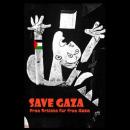


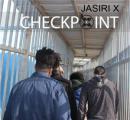
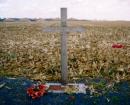


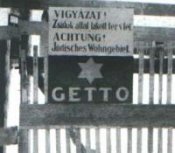
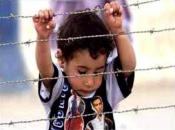

Il ghetto di Gaza
The Gaza Ghetto
[2013]
Così ci ha brevemente scritto: “Seguo questo sito fin quasi dai suoi inizi, e vi invio questa cosa che ho scritto in una lingua che non è la mia, ma che è sedimentata durante lunghi anni di studio e di comunanza. So che il sito si avvicina ad un traguardo importante, e ho quindi immaginato di dare la parola a chi ha vissuto ed è stato sterminato nei ghetti europei durante il Nazismo e la guerra, e di dargliela in quella che era la lingua che parlava. Potrà forse apparire una provocazione, e lo è senz'altro poiché, in questa lingua, le vittime di allora si affratellano con quelle di oggi, coi ghetti a loro volta istituiti dai sopravvissuti.
Fa impressione, o almeno dovrebbe farla, che persone scampate all'orrore nazista abbiano desiderato ricreare il ghetto nei confronti di altri esseri umani. Ovunque si vada a parare, questa è la semplice e dura realtà, e non c'è tanto da girarci intorno o da fare orrende acrobazie. Gaza è un ghetto come lo è stato Varsavia. A Gaza è riservato lo stesso destino. Per questo ho voluto unire e affratellare Varsavia e Gaza. Orrore è fratello solo di altro orrore, muro di altro muro. Questo è il significato di ciò che ho scritto.”
Non resta molto altro da aggiungere a quanto detto dall'anonimo contributore. Siamo convinti che possa contribuire a fare un po' piazza pulita anche delle ipocrite e ridicole accuse di “antisemitismo” rivolte contro chiunque non sottostia ai ricatti planetari di chi si serve della Shoah, che in questo sito è tutt'altro che “negata”, per riprodurre ghetti, sterminio e morte. Il ghetto di Gaza sta là a confermarlo. [CCG/AWS Staff]
With the following text, that we do not know whether to call a song, an oration or something beyond all that, “Canzoni Contro la Guerra / Antiwar Songs” reaches the number of 20,000 songs. This is reached with something totally new, that never occurred before: an original text specially written for this occurrence. We received it from someone who requested us not to disclose his/her name, and who wrote it in the Yiddish language also providing us with a transcription and an Italian translation (the English translation has been made by the site staff).
He/she sent us this brief communication: “I am following this website since its very beginning, so I send you this text I wrote in a language that is not native to me, but that has sedimented in me during long years of study and things in common. I know this site is in sight of an important date, and so I have imagined to give the word to those who have lived and have been exterminated in the European ghettos under Nazist rule and during the war, and to give them it in the language they really spoke. It may seem a provocation, and no doubt it is so because, in this language, yesterday's victims become brothers of today's victims in the ghettos the survivors have been building in their turn.
It makes -or at least should make- great impression, that those who survived the Nazi horror have then decided to put and close other human beings in newly created ghettos. Whatever it may be said about this, this is simple and hard reality, and there is no gainsaying this. Gaza is a ghetto just like Warsaw. Gaza shares the same lot as Warsaw. That's why I have wished to unite Warsaw and Gaza in true brotherhood. Horror can only be brother to horror, a wall to a wall. Such is the meaning of what I have written.”
One could scarcely add something to what our anonymous contributor said. We firmly believe that all this may help get rid also of the hypocritical and ridiculous accusations of “anti-semitism” regularly made by those who do not give up blackmailing the world by using the Shoah, that this website is very far from denying, in order to reproduce ghettos, extermination and death. The Gaza ghetto stands there as a living witness thereof. [CCG/AWS Staff]